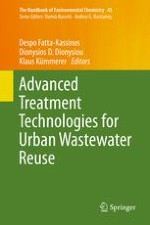2016 | OriginalPaper | Buchkapitel
Recent Developments in Potable Water Reuse
verfasst von : Jörg E. Drewes, Nils Horstmeyer
Erschienen in: Advanced Treatment Technologies for Urban Wastewater Reuse
Aktivieren Sie unsere intelligente Suche, um passende Fachinhalte oder Patente zu finden.
Wählen Sie Textabschnitte aus um mit Künstlicher Intelligenz passenden Patente zu finden. powered by
Markieren Sie Textabschnitte, um KI-gestützt weitere passende Inhalte zu finden. powered by
